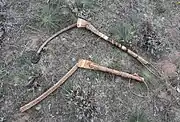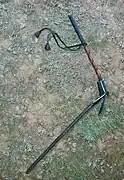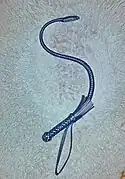
The nagaika[1] (Russian: нага́йка, pronounced [nɐˈɡajkə]) is a short, thick whip with round cross-section used by Cossacks, borrowed from Nogai people, hence the original name "nogaika", or "Nogai's whip".[2] It is also called камча, kamcha from the Turkic word "kamci" for "whip". The latter word is also used for short whips of Central Asian origin.
The nagaika was made out of leather strips by braiding. It was possible to have a piece of metal at the tip of the whip.
The main purpose of a nagaika was to urge a horse. A metal piece was used for defense against wolves. According to Vladimir Dahl's "Explanatory Dictionary of the Live Great Russian language", this nagayka was called volkoboy (волкобой, "wolf-slayer").
In modern times the descriptions of the military use of nagaika tend to be mythologized, and in the past the prime and predominant use was to drive horse.[3] At the same time nagaika was known to be used against unarmed people, e.g., for corporal punishment or to disperse public disorders[4] (e.g., during Russian Revolutions),[5] so that a cossack with nagayka has become a symbol of tsarist oppression.
In 2005 the Cossacks were reformed and armed with nagaikas in addition to other traditional weapons. In 2014, members of Pussy Riot were attacked by Cossacks wielding nagaikas and pepper spray while protesting.[6]
Gallery
 Orenburg Cossack with a whip in his hand
Orenburg Cossack with a whip in his hand Ural Cossacks on the march. Some riders have nagaikas visible
Ural Cossacks on the march. Some riders have nagaikas visible Kalmyk lashes "malia" and "tashmg"
Kalmyk lashes "malia" and "tashmg" A kind of Kalmyk nagaika with a uniformly tightly woven, almost unbending leather whip without tapering to the tip
A kind of Kalmyk nagaika with a uniformly tightly woven, almost unbending leather whip without tapering to the tip Nagaika of the Kuban and Terek Cossacks
Nagaika of the Kuban and Terek Cossacks
References
- ↑ "Nagaika". Merriam-Webster.com Dictionary. "Nagaika". Oxford English Dictionary (Online ed.). Oxford University Press. (Subscription or participating institution membership required.).
- ↑ This article incorporates text from a publication now in the public domain: . Brockhaus and Efron Encyclopedic Dictionary (in Russian). 1906.
- ↑ "О современной нагайке и ее истории" "About the modern nagaika and its history"
- ↑ Hingley, R. (1994). Joseph Stalin: Man and Legend. Smithmark. p. 27 ("nagayka"). ISBN 9780831758691. Retrieved 2015-07-07.
- ↑ The Living Age, July 26, 1902, "The Russian Awakening"
- ↑ Lally, Kathy (19 February 2014). "Whip-wielding Russian Cossacks attack Pussy Riot members near Sochi Olympics". The Washington Post. Retrieved 27 September 2015.
Members of the performance-art group Pussy Riot were attacked on a public plaza Wednesday by Cossacks brandishing whips and discharging pepper spray, a day after police picked them up and held them for nearly four hours without charges.
External links
- "Nagayka", construction and technique (an excerpt from the book Г. Э. Адамович, Р. И. Федин "Владение холодным оружием (казачьи техники)") (in Russian)
- "Вольная станица" design and kinds (in Russian)